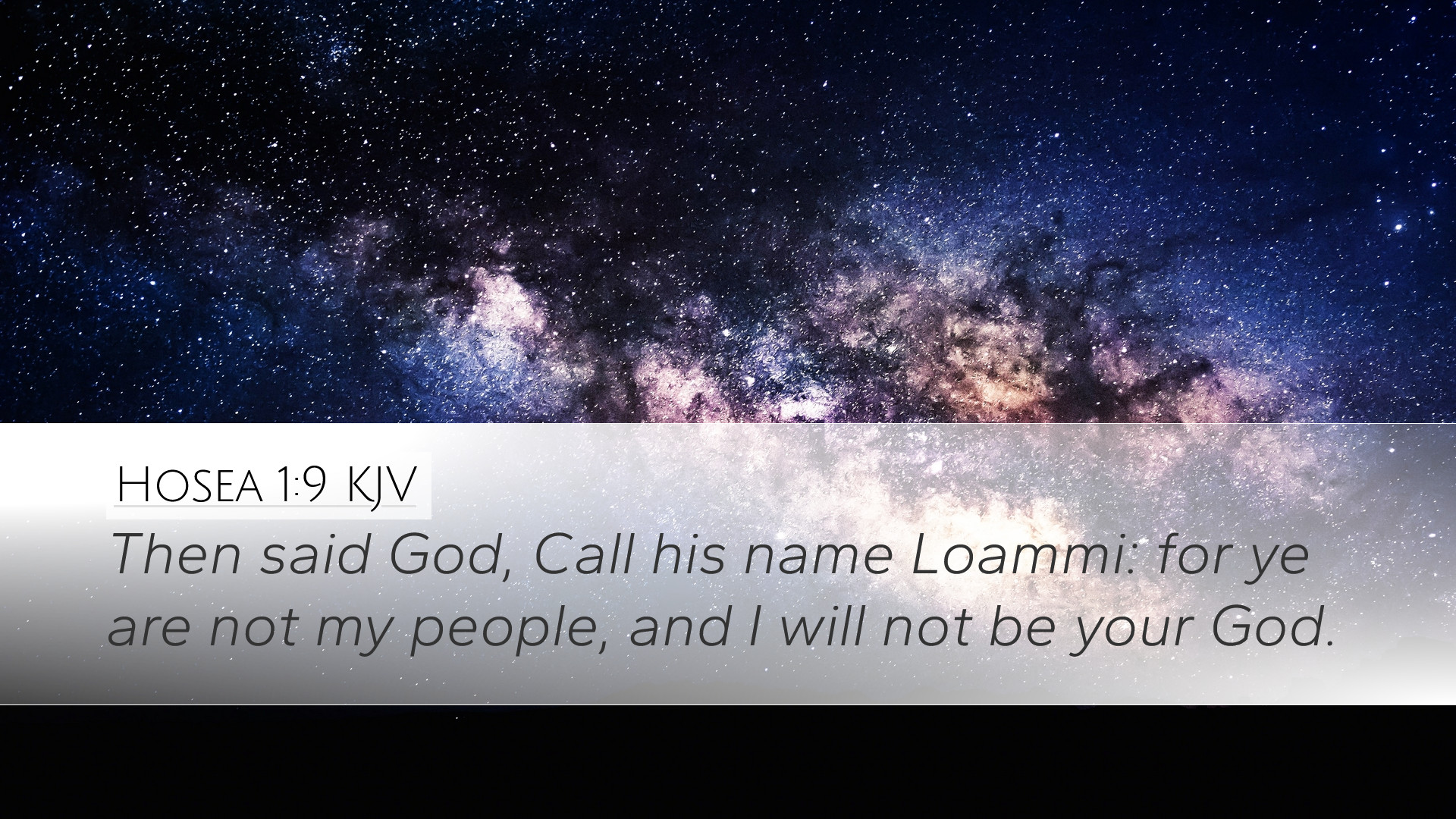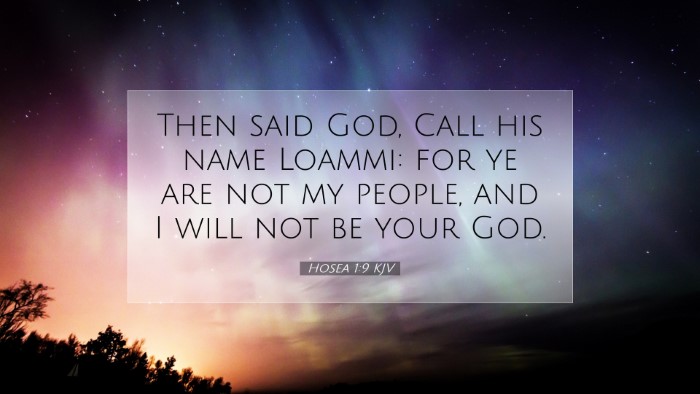Old Testament
Genesis Exodus Leviticus Numbers Deuteronomy Joshua Judges Ruth 1 Samuel 2 Samuel 1 Kings 2 Kings 1 Chronicles 2 Chronicles Ezra Nehemiah Esther Job Psalms Proverbs Ecclesiastes Song of Solomon Isaiah Jeremiah Lamentations Ezekiel Daniel Hosea Joel Amos Obadiah Jonah Micah Nahum Habakkuk Zephaniah Haggai Zechariah MalachiHosea 1:9
Hosea 1:9 KJV
Then said God, Call his name Loammi: for ye are not my people, and I will not be your God.
Hosea 1:9 Bible Commentary
Commentary on Hosea 1:9
Hosea 1:9 states:
"Then said God, Call his name Loammi: for ye are not my people, and I will not be your God."
Introduction
This verse represents a significant turning point in the message of the prophet Hosea, reflecting the judgment and rejection that the nation of Israel faces as a consequence of their unfaithfulness. Commentaries from public domain sources provide a deep analysis of the theological, historical, and practical implications of this verse.
The Meaning of the Names
The name "Loammi" translates to "not my people," which serves as a powerful symbolism of the estrangement between God and Israel. According to Matthew Henry, this designation illustrates the consequent alienation resulting from Israel's idolatry and rebellion against the covenant established with God.
Adam Clarke notes that names in Hebrew culture often encapsulate divine truths or messages. By naming the child Loammi, God articulates His withdrawal of favor and the breaking of the relationship that once existed between Himself and His people. This renaming becomes a prophetic statement of Israel’s spiritual state.
Theological Implications
This verse highlights several critical theological concepts:
- Divine Judgment: The renouncement of Israel as "not my people" underscores the severe consequences of sin. Albert Barnes emphasizes that God's rejection does not signify His abandonment altogether but rather a call to repentance and recognition of their sin.
- Covenant Relationship: The essence of being God’s people encompasses divine favor, protection, and presence. God's declaration in Hosea 1:9 signals a broken covenantal relationship due to persistent disobedience.
- Hope for Restoration: Despite the harshness of this message, the wider narrative of Hosea also contains a thread of hope and future restoration. Barnes asserts that while Israel faces judgment, there remains a pathway back to reconciliation through repentance.
Historical Context
In understanding Hosea 1:9, one must appreciate the historical context of Israel during the time of Hosea’s prophecy. Matthew Henry explains that the people of Israel had immersed themselves in idolatry and immorality, forsaking their relationship with Yahweh, which had significant societal ramifications.
The nation was characterized by political instability, moral decay, and the influence of surrounding pagan cultures. This backdrop makes Hosea’s message not only prophetic but profoundly relevant for addressing the challenges of faithfulness in turbulent times.
Practical Applications for Today
For modern pastors, theologians, and students of scripture, Hosea 1:9 invites reflection on several areas of practical application:
- The Importance of Faithfulness: Just as Israel faced judgment for their infidelity, contemporary believers are called to faithfulness in their relationship with God. This calls for a serious evaluation of personal and collective fidelity to God’s commandments.
- Renaming and Identity: The implications of divine renaming extend to believers today, serving as a reminder of the grace extended through Jesus Christ, who restores us to a new identity as 'children of God' despite our past failures.
- The Call for Repentance: The verse emphasizes that estrangement from God can be remedied through genuine repentance. Pastors are encouraged to preach a message of repentance that is both demanding and hopeful.
Conclusion
Hosea 1:9 serves as a profound reminder of the nature of God's holiness and the seriousness of sin. Drawing from the insights of revered commentators such as Matthew Henry, Albert Barnes, and Adam Clarke, we see how this verse connects the historical narrative of Israel with timeless theological truths relevant for believers today.
Ultimately, while God's pronouncement may sound harsh, it is partnered with God’s longing for restoration and the promise of redemption, emphasizing that even in our failures, God's desire is to bring us back into covenant relationship with Him.


